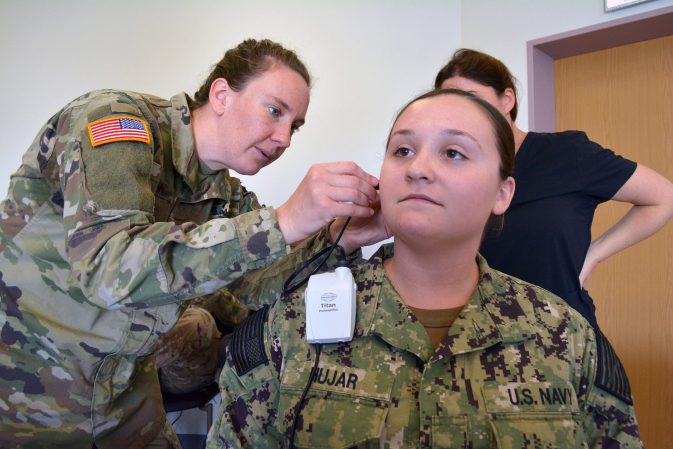When it’s time for troops to hang up their uniform for the last time and go pick up that beautiful DD-214, they’re subjected to countless classes on how to adapt in the civilian world and use the strengths they’ve picked up in the military to give themselves a leg up in a competitive civilian marketplace.
Troops who had more POGy jobs in the military may have an easier time making the transition. If you worked in the commo shop, there’s countless IT desks out there you can apply for. Flight-line mechanics can make bank working for airlines. But even combat arms guys aren’t limited to positions as security guards or fast-food workers, no matter how many times the retention NCO tells you so.
The fact is, any good soldier, Marine, sailor, or airman who fit perfectly in the formation comes away from service with valuable skills that employers look for in potential employees. Here are a few qualities that veterans have had drilled into them every day since basic training that help them stand out over most civilian competitors.
Here are 7 veteran qualities that civilian employers go crazy over

(U.S. Air Force photo by Master Sgt. Brian Ferguson)
The 15-minutes-prior schedule
If you’re on time, you’re late. If you’re fourteen minutes early, you’re still late. Civilians tend to pull some excuse that explains why it’s definitely not their fault that they’re arriving at 10:05 for a 10 a.m. meeting.
That fifteen-minute buffer works wonders with the way most civilians schedule things. The higher up in an organization you go, the more promptly meetings tend to start. If you’ve been ready for 15 minutes already, nobody will end up waiting on you. You’re set.

(U.S. Marine Corps)
Blunt honesty
We’ve seen it happen a million times: Someone throws out an awful suggestion and it’s met with agreeable silence. Everyone is too afraid to speak up because their reputation is on the line for speaking out of turn. Then, out of the corner, a veteran speaks up and says, “well that’s dumb. Why the f*ck would we do that?”
If there’s one thing that sets a veteran apart in a board room it’s their ability to avoid being a yes man. It may ruffle the feathers of people who expect everyone to nod along, but at the very least, it moves the meter.

(U.S. Army photo by Sgt. Alfonso Corral)
No aversion to manual labor
Veterans can safely celebrate the fact that when they get a new job, if something comes up that’s not in the job description, it’s not expected of them. That’s right: if you’re now an office drone working some cubicle job, no one will randomly get on your ass for not cleaning the break room.
Sometimes, however, things just need to get done. Using that same example, an entire day could go by in a civilian office and people will simply walk by that messy break room thinking, “it’s not my responsibility.” Most vets, on the other hand, would instinctively clean it up without giving it a second thought.

Acknowledgement of hierarchy
Things are nice and easy when everyone wears their rank on their uniform. You can instantly look at their insignia and recognize where they stand in the chain of command — no questions asked. That simple insignia tells the world what is expected of you, in accordance with your rank.
The civilian workplace doesn’t really have those kinds of markings — but that doesn’t mean there isn’t a pecking order. Vets just need to know who’s in charge of them and who’s in charge of the people in charge and they’re set.

(U.S. Army photo by Spc. Andrew Parks)
Willingness to take a leadership position
Everyone wants the bigger job, bigger desk, bigger pay check, but too few people are willing to exit their comfort zone to get it. They’ll whine about that one guy getting an extra zero in his paycheck but slink at any opportunity to prove their worth.
Vets, on the other hand, will usually take it upon themselves to organize their coworkers if they see a lack of leadership and make themselves the face of their team without even realizing it. Willingly taking on that leadership role proves to the company that the vet is serious and values the company. This almost always gives that vet more firepower when it comes time to shoot for a raise.

(U.S. Army photo by Sgt. Ken Scar)
Separation of work life and personal life
Keeping what’s going on in your personal life from affecting your work life is a difficult skill to master. It’s a beyond-useful talent to be able to set aside any personal problems when it’s time to get serious and work. The other part of this equation is not letting personal drama bleed into getting the mission done.
Troops and vets have been constantly cattle prodded into moving forward and to quit whining about unrelated stuff. This is second nature.

(U.S. Army photo by 1st Lt. David W. Cline)
The mission-first mentality
If there’s a single quality that civilian employers can expect from nearly every veteran, it’s that veterans will always be task-oriented. They’ll see a checklist as a thing to complete rather than a thing to dread.
From the moment troops enlist, they’re taught to juggle roughly seven thousand different tasks inherent to military life, in addition to those associated with their given MOS. There’s a job to be done, so let’s get to it.


























